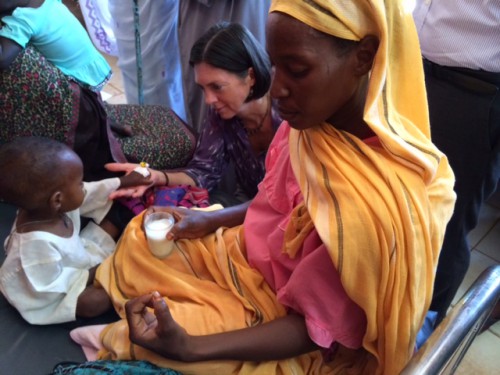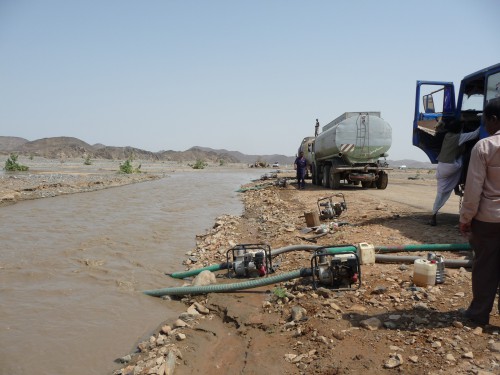8th October 2014
DFID Sudan: Trips to the frontline
(Guest blog by colleagues from DFID Sudan)
The UK’s Department for International Development (DFID) supports programmes which deliver life-saving humanitarian assistance and improve access to basic services for some of Sudan’s most vulnerable people. It also aims to help lay the foundations for a more democratic, peaceful and prosperous future.
Visiting the field is essential for DFID to monitor how our programmes are progressing and to ensure that UK-provided funds are being managed in the right way, to achieve results for the poorest people. It is not however an easy process! Visits to sites outside of Khartoum require advance planning, plenty of paperwork and determination in the face of bureaucracy. Nevertheless, members of DFID’s Leadership Group recently travelled the breadth of Sudan to see the difference that our programmes are making to people’s lives.
Travelling south to White Nile, west to Darfur and east to Red Sea State, we witnessed partner organisations operating under extremely difficult conditions, took stock of what UK-funded programmes are achieving, and heard from Sudanese people who are benefitting from them.
DFID Head of Office Joanna Reid headed south to White Nile State with UNICEF to see how South Sudanese refugees are faring and to understand the impact of UK support. The UK recently announced that it would provide £30 million to enable organisations including UNICEF, WFP and UNHCR to help South Sudanese refugees in Ethiopia, Uganda, Sudan and Kenya.
In addition, DFID recently provided £700,000 for the World Food Programme in Sudan to help meet the food needs of refugees who have crossed the border, and we are planning further support.

Last minute wrangling over travel permits delayed Joanna’s departure by a day and, upon arrival in White Nile, the team spent a further five hours negotiating permission from the authorities to cross the river to the refugee sites. It was clear that the operating environment for agencies providing aid is extremely difficult and that a lot of perseverance is required to reach needy people in the state: three of the four refugee camps which have been set up are inaccessible by road in the rainy season.
Despite these challenges, many of the refugees had reacted resourcefully to life in a camp, volunteering as teachers or health-workers. The visit also underlined how important it is not to neglect local communities who may be living side by side with the refugees yet have little access to basic services. Joanna was really struck to see that whilst the camp she visited was relatively orderly and providing services, the host community did not even have a school, health services or access to clean water.
Clare Barrington, Senior Infrastructure Adviser, and Malik Balla, Policy Adviser, drove 12 hours northeast across the desert to Port Sudan to assess the status of water and sanitation services. With leaking pipes and no functioning treatment system, Port Sudan is using unsafe water contaminated with pathogenic bacteria. A new DFID programme will carry out an in-depth assessment of the water and sanitation situation in the city and advise the State government on priorities for rehabilitation and expansion of services, ensuring poor households gain access and pay less.

Clare and Malik met the Wali, a number of Ministers, the State Water Corporation, the health Ministry’s Department of Preventive Medicine, and the State Water Quality Lab. They also visited a number of sites, including the Arbaat dam and wells – originally built by the British to supply water for Port Sudan – and one of Port Sudan’s desalination units, as well as a number of sites where water is being collected by donkey carts. The visit really helped to improve our understanding about the nature of the water problem in Port Sudan, and to lay the foundations for the next steps in the programme.
DFID Deputy Head Cate Turton and Humanitarian Adviser Ian Byram travelled west on a one and a half day journey by plane and helicopters to reach central Darfur. Security here, as in other states of Darfur, has deteriorated over the last two years leading to hundreds of thousands of people being displaced.
In Darfur, DFID funds the World Food Programme to provide vulnerable people with food vouchers which help them to meet their food needs. Since late last year, DFID has provided £21.9 million to ensure that the voucher programme can continue to deliver this vital support. DFID also supports the Common Humanitarian Fund (£17 million this year) which provides funds to NGOs and UN agencies to deliver interventions to meet basic needs, including emergency nutrition, water and sanitation, and health services.

Cate and Ian came away understanding that empowering organisations and dedicated humanitarian workers on the ground is critical to navigating the complex patchwork of people, politics and power that characterises Darfur. They saw how innovations – such as community managed solar power water pumps and food voucher smart cards soon to be used by WFP – will be an essential part of the humanitarian response which, in the current context of deteriorating security, is likely to be needed for many years.
Collectively, the DFID team saw just how desperate the humanitarian and development situation is in Sudan and how difficult it is to deliver results. But we also witnessed first-hand the dedication of agencies and especially of Sudanese colleagues. The challenge for agencies such as ours is to stay in close touch with these inspirational people and to provide support and flexibility to enable them to deliver and innovate.
Sudan’s people need long-term development assistance but the multiple internal and external conflicts which create humanitarian crises take up most of DFID’s energy and resources instead. Without real commitment from the Government to invest in poverty reduction and to make resources available for expanding access to basic services for all citizens, it will be difficult to move beyond a sticking plaster approach.